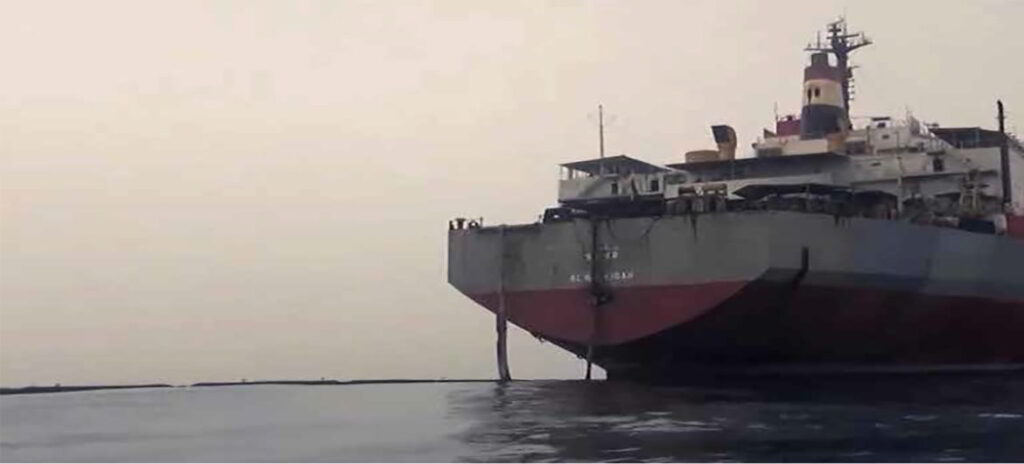A very large crude carrier the Nautica, bought last month by the UN Development Programme (UNDP) from Euronav, as part of UNDP’s coordinated operation to remove oil from decaying FSO Safer, has set sail from Zhoushan, China heading for the Red Sea.

FSO Safer; Source: Office of UN Resident and Humanitarian Coordinator for Yemen
The Nautica was in drydock in Zhoushan, China for regular maintenance and modifications. The vessel is expected to arrive in early May. The VLCC will replace FSO Safer once more than a million barrels of oil is transferred from the supertanker, which poses a massive risk of an oil spill of catastrophic proportions.
FSO Safer is currently moored about nine kilometers off Yemen’s Ras Issa peninsula, where it has been since 1988. The supertanker was constructed in 1976 as an oil tanker and converted in 1987 to be a floating storage facility. The vessel is single-hulled and is believed to contain an estimated 1.148 million barrels of light crude oil.
FSO Safer has not been maintained since 2015 because of the conflict in Yemen, and it has decayed to the point where there is an imminent risk it could explode or break apart, which would have disastrous effects on the region.
UNDP is contracting the global leading marine salvage company SMIT to ready the Safer and safely carry out the ship-to-ship transfer of the oil.
“The departure of the Nautica, and its onward journey to the Red Sea, is a significant next step in the complex operation to take on the oil from the Safer. This moment marks the culmination of many months of preparation and coordination. It has involved many partners among them our UN sister agencies, a global community of funders – from government and foundations to school classes – as well as international experts to ensure we succeed and prevent a humanitarian, environmental and economic disaster,” said Achim Steiner, UNDP Administrator.
“We are in a race against time and I urge leaders in government, CEOs of corporations and any individual in a position to contribute to step forward and support us in keeping this operation, that is fast reaching a critical stage, on track,” he added.
UNDP said that while the project has received significant international support, the spiraling cost for VLCCs, in a market affected by the war in Ukraine, and other factors, more funding is needed to complete the emergency phase of the plan. As of 4 April, the UN had received firm commitments for $95 million. The total budget for this first phase is $129 million, leaving a gap of $34 million.
“The sailing of the vessel that will take on the Safer’s oil brings us closer to preventing a catastrophe,” said David Gressly, the UN Resident and Humanitarian Coordinator for Yemen, who has led on UN system-wide efforts on the Safer since September 2021.
“The UN family, including UNDP, UNEP, IMO, OCHA, WFP, member states, private companies and the public have all played a part in the UN-coordinated plan. We have the best available technical expertise and political support from all sides. Donors have been generous. We just need the final piece of funding this month to ensure success.”
To fill the budget gap, the UN is appealing to Member States and private entities, and the global public through a crowdfunding appeal.
The impact of a potential oil spill from FSO Safer would be devastating for local fishing communities, with 200,000 livelihoods at risk of being wiped out instantly. Toxic pollutants would put whole communities at risk, while millions could be affected by highly polluted air. The ports of Hodeidah and Saleef, vital for bringing in food and supplies to a country where 17 million people require food assistance, could be closed off. Desalination plants could also be shut down, depriving millions of a source of water.
Oil from the Safer could potentially reach the African coast, with serious implications for any country along the Red Sea. The environmental impact would be severe, with coral reefs, mangroves, and other marine life at risk. Fish stocks would take 25 years to recover, compounding the economic devastation already being felt.
The cost of cleanup alone is estimated to be around $20 billion, while disruptions to shipping through the Bab al-Mandab strait could cost billions more in global trade losses every day.
Therefore, the stakes are high, and urgent action is needed to prevent a catastrophe that could affect millions of people across Yemen and beyond.